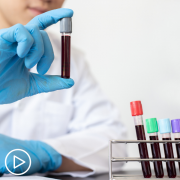How Does Essential Testing Affect Myeloma Care and Treatment?
How Does Essential Testing Affect Myeloma Care and Treatment? from Patient Empowerment Network on Vimeo.
Why is it important to ask about essential testing for your myeloma? Find out how test results could reveal more about your myeloma and may help determine the most effective care for your individual disease.
Related Programs:

Which Myeloma Treatment Is Right for You? What You Need to Know |

|

|
Transcript:
Why should you ask your doctor about essential myeloma testing?
When a patient is diagnosed with myeloma, they typically undergo a series of tests that aid in diagnosing and staging their individual disease. The standard tests include:
- Blood Test
- Urine Test
- Bone Marrow Biopsy, and
- Imaging
As research in the field evolves, genetic profiling via more in-depth cytogenetic testing is increasingly common to further classify your myeloma. This testing often identifies unique biomarkers of the myeloma, such as translocations or changes in chromosomes.
So why do the results of these tests matter?
- The presence of certain biomarkers can indicate a patient is low-risk, which can suggest a more positive prognosis.
- There are certain biomarkers that indicate high-risk myeloma, meaning an aggressive treatment approach may be more effective.
Knowing your risk in myeloma is useful to your healthcare team when choosing a treatment approach or may help in determining if a clinical trial might be right for you.
How can you Insist on the best care for YOUR myeloma?
- First, always speak up and ask questions. Remember, you have a voice in YOUR myeloma care. Your doctor is expecting you to ask questions and should be able to answer them.
- Ask your doctor if you have had or will receive genetic testing for risk stratification and how the results may impact your care and treatment plan. Be sure to ask for paper or electronic copies of your important test results.
- And finally, bring a friend or a loved one to your appointments to help you process information and to take notes.
To learn more about your myeloma and access tools for self-advocacy, visit powerfulpatients.org/myeloma










